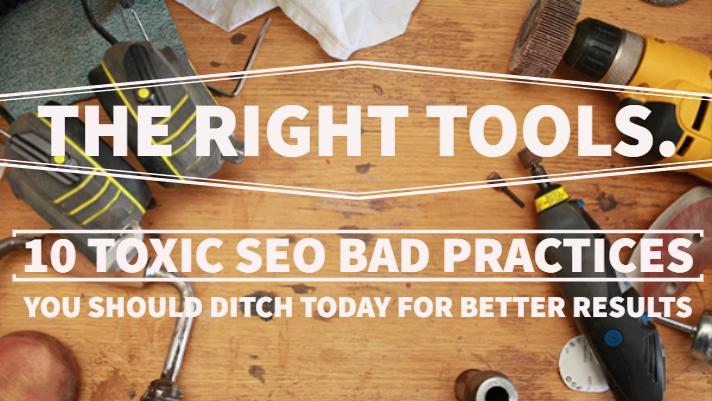
SEO is integral to your business success, and there are a lot of ethical ways to go about building your website traffic. However, there are a few legacy SEO bad practices lingering out there that you should avoid.
Link farms, comment SPAM, cloaking and other spammy SEO techniques just won’t get you anything but a big penalty in 2019.
And as link building gets more traction again, the proliferation of these risky techniques won’t be going away. To avoid major SEO mistakes, you need to know what to look out for.
Let’s face it: it’s not 2012 anymore, family, and spamming just isn’t worth the risk.
Check out our list of the 10 most toxic SEO bad practices that you need to swerve by this year. Plus, we won’t just tell you what to avoid. We’ll give you the information you need to make a change.
Keyword Stuffing
This just needs to stop.
On the list of bad SEO habits, this might just be the worst.
From 2010 through 2013, Google implemented some major algorithm updates targeted at fighting keyword stuffing (among other devious SPAM tactics).
In 2019, there is just absolutely no benefit to doing this, and Google is almost completely impervious to it.
In short, it doesn’t work. Just write better content.
What To Do Instead:
Here’s how to avoid keyword stuffing and start making great content:
Look at what your competitors have on the SERP you want to rank higher on.
Count how many words they have, how many photos they use, how many links they have and create a piece of content that is longer and more comprehensive.
Longer, deeper content will naturally rank higher on Google.
You don’t have to cheat the system to win. Better content with more engagement will beat keyword stuffing any day of the week.
Dead Weight (Zombie) Content
This is one of the biggest issues I still see in 2019.
And I understand where it comes from.
At one time, Google rewarded pages that focused on just one keyword.
If you had a single page that precisely described “Green Striped Gym Shorts,” you could reliably count on ranking for that keyword.
In 2019, Google focuses more on holistic content quality and on user intent. This means that a more in-depth, authoritative page on “Gym Shorts” will almost always outrank that more focused “Green Striped Gym Shorts.”
In fact, that was once our secret recipe to getting our clients to page one.
Today, these highly focused pages get very little traffic, and because of that Google sees them as relatively unauthoritative pages that don’t get shown.
Instead, Google ends up preferring those pages that go deeper and just a little broader.
However, be careful not to go too broad, because unfocused pages will also hurt your SEO.
What To Do Instead:
A single page can refer to multiple keywords that refer to the same service (such as gym shorts, striped gym shorts, workout shorts, athletic shorts).
Google relies heavily on latent semantic indexing and can understand that there is very little functional difference between those terms.
Unrelated Keywords
It might seem like a good way to bring in traffic: find keywords that are very, very loosely related to your industry, write a post about it and wait for the love to flow in.
However, users can see through that tactic and so can Google.
If you’re posting on high search volume terms that are not closely related to your industry, users will bounce from your site and Google will penalize the authority of your pages.
What To Do Instead:
Publish fewer articles and optimize them often.
When you carefully choose your content for shareability and SEO, you ensure that the traffic you bring in is more highly engaged.
Good SEO practices are just good business.
Duplicate Content
Duplicate content can slow down search engines and cause them to disregard that duplicated page.
Posting the same content on multiple places on your website, or on other websites, may prevent the site you really want to show from being indexed.
It reduces the amount of control you have over the content that Google chooses to show, and it lowers the authority of that content.
It’s definitely something you want to avoid at all costs in 2019.
What To Do Instead:
Post original, well-written content all the time.
If you need to post duplicate content on your web pages for business reasons, make sure to “noindex” the page you wouldn’t want to appear in search engines, and select that page as the “usercanonical.”
That tells Google which page the authoritative version is, and which page should be disregarded.
Indiscriminate Guest Posting
Guest posting was once the most reliable way to get an authoritative backlink to your site.
If you had connections to another blog, you would just exchange posting opportunities, link to each other’s content and both sites would win.
In 2019, for the most part, having unrelated websites linking to your site is worse than having no links at all.
This is flagged as a transactional link and not good for user experience, so Google can penalize for this.
What To Do Instead:
You can still guest post, but you should do it in a way that is best for the user.
That means reaching out to industry publications to publish your articles or link to your website in a way that makes sense in the prose of the article.
If you have links that are paid on your site, make sure to “nofollow” these links to show Google that they are advertisements so that you avoid any penalties.
Slow Page Load Speeds
If your website takes longer than six seconds to load, you’re almost guaranteed not to make it to a high ranking on Google.
Most users in 2019 expect their websites to load in under 4 seconds, and, if they don’t, they’re far less likely to visit again.
What To Do Instead:
Work with your web host to increase server load times.
Your website files should also be compressed and your CSS files minified for best performance.
Make sure to check your site speed regularly. Websites like GTMetrix offer free reports.
Cloaking
“Cloaking” refers to placing invisible content on a page purely for the purpose of increasing rankings, not improving user experience.
This can include placing white text on a white background and other methods.
Search engines, when they discover this type of behavior, can dole out harsh penalties, including de-indexing your website.
What To Do Instead:
Instead of investing in SPAM techniques for your SEO, which might give you a large boost in traffic and rankings initially, at the risk of huge losses down the road, you should plan a solid content strategy and create a great user experience on your website.
Nothing beats the performance of a solidly-built website with great multimedia following a well-thought-out content strategy.
Not Fixing Technical Issues
Websites break. It just happens!
Auto-updates, new plugins, server issues…websites are not static properties. The internet is much closer to an organic being than anyone would like to think.
Enough with the philosophy, I know.
In any case, you should be investing in some sort of software to warn you about these issues.
Leaving technical errors up can lead to a loss in website authority that can be very hard to recover from.
Some common issues that owners often leave unresolved:
- Redirect chains, where an original URL has been redirected to more than one new URL.
- AMP/Mobile design errors
- Multiple H1 tags
- Sitemap errors
- Unintentionally “noindex” or blocked content
What To Do Instead:
There is plenty of software available to track all of this. We love SEMRush for its SEO focus and extensive features.
But just being sure to have Google Search Console & Google Analytics enabled, and that you monitor both regularly, is usually enough for most websites.
Purchasing Links, Bad Directories & Link Farms
This could all spell extremely bad news for your website in 2019.
You might find yourself with a competitor who has an extremely spammy link profile and they dominate the market. It’s not fair, we know.
So, what are you supposed to do about this?
Well, there’s not much you can do.
However, following their lead is not the way to go. Eventually, after more algorithm updates, those sites are bound to get punished, and you don’t want your site to go down with them.
What To Do Instead:
Doing it the right way is hard, but to be honest, it’s always going to be more effective.
One authoritative link can be worth 50 spammy links.
The authority that a relevant link with good anchor text from an authoritative website gives is more than worth the time it can take in research, writing, design and outreach.
Keep on with the white hat link building SEO, and your efforts will pay off.


